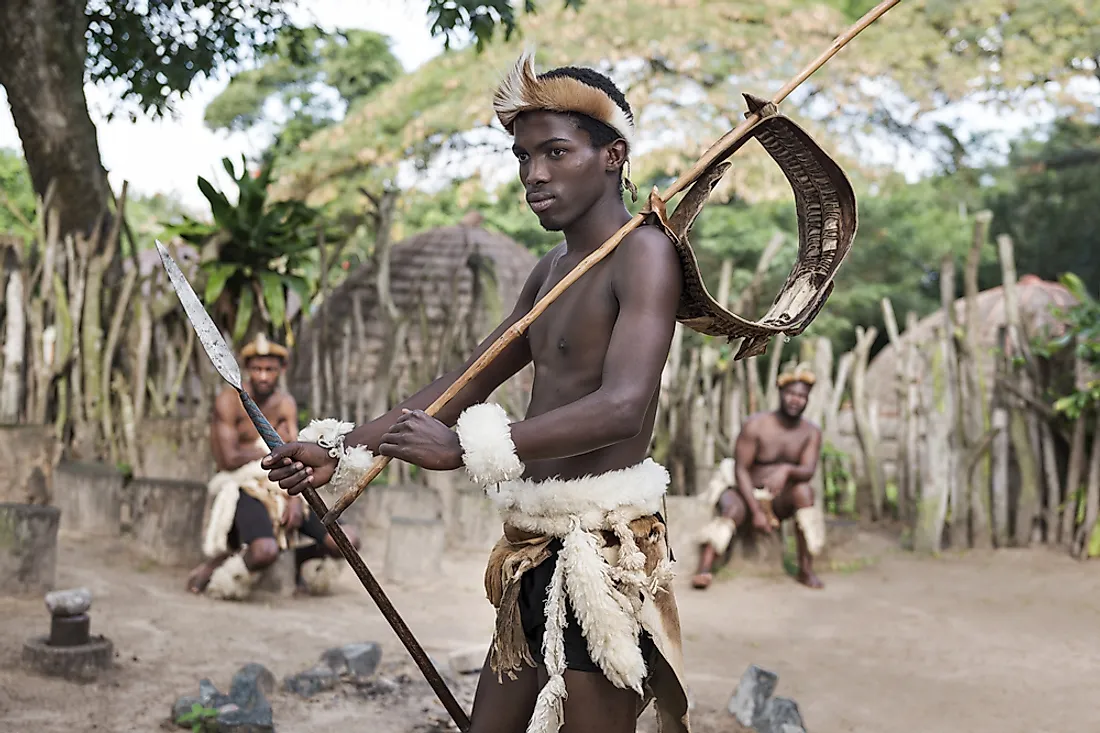What and Where Was the Zulu Kingdom?

The Zulu kingdom also goes by the name Zulu empire or Kingdom of the Zululand. From 1816 to 1897, it was a well-established monarchy situated in Southern Africa, located along the Indian Ocean coast. The Pongola River bordered the Zulu kingdom on the north and the Tugela River on the south. The kingdom was extensive and dominated the areas of the current day Southern Africa and KwaZulu-Natal. The Zulus had enjoyed many years of victory in wars. However, in the 1870s, conflict arose between the Zulu Kingdom and the British Empire. Zulu kingdom was defeated resulting in its fall. The area dominated by the Zulu Kingdom joined the Natal colony and later formed a part of the Union of South Africa.
History of the Zulu Kingdom
The initial king of the Zulus was Senzangakona. He had an illegitimate son called Shaka Zulu. Senzangakona exiled his illegitimate son Shaka and his mother Nandi. Shaka Zulu found refuge in the Mthethwa Paramouncy and fought as a warrior under the leadership of Jobe and later under the leadership of Dingiswayo. When Shaka's father Senzangakona died, Dingiswayo assisted Shaka Zulu to become the chief of the Zulu kingdom. Later when Dingiswayo died in 1818, Shaka became the leader of the entire alliance of Mthethwa.
Shaka Zulu formed a centralized and a well-organized Zulu state. He achieved this by initiating many cultural, political, social, and military reforms. He transformed the army by developing innovative tactics and employing state-of-the-art weapons. He also integrated spiritual leadership into his empire by involving witchdoctors. He absorbed other clans into the Zulu and gave them equal rights in both army and civil service. Shaka Zulu survived the attacks from Zwide the king of Ndwandwe both in 1818 and fully defeated Zwide in 1820. By 1825, Shaka had conquered a kingdom covering an area of 30,000 sq km.
Shaka Zulu's Death
Dingane, Shaka's half-brother conspired with another half-brother, Mhlangana, and Mbopa to murder Shaka Zulu in 1828. Upon assassinating Shaka Zulu, Dingane then murdered his other half-brother, Mhlangana, and assumed the throne. He destroyed all of his royal kins. In order to secure his position, Dingane executed numerous past supporters of Shaka Zulu. He only spared Mpande, his half-brother, as he considered him too weak to be a threat.
Battle with the Voortrekkers
Before facing the British, the Zulus first faced the Boers. The Boers first clashed with the Ndebele kingdom and then encountered the Zulu kingdom. In 1837, Piet Retief, the Voortrekker leader paid a visit to Dingane in an effort to negotiate a land deal for Voortrekkers. Dingane requested him to assist him to recover cattle stolen from Zulu kingdom by a local chief as part of the bargain. Retief agreed but Dingane later attacked Retief and his people while attending a dance at Zulu kingdom killing many of them. Dingane and the Zulus later suffered a major defeat when they attacked Voortrekker settlers in 1838.
Other Zulu Leaders
Mpande succeeded his half-brother Dingane. Mpande led the Zulu kingdom until 1872 when he died of old age. A battle broke out between Mpande's sons Mbuyazi and Cetshwayo in an effort to inherit the kingdom. Mbuyazi died leaving Cetshwayo to succeed his father as the leader of the Zulus.
The Defeat of the Zulu Kingdom
At the end of December 1878, British forces crossed the Tugela River and invaded the Zulu Kingdom. On January 22, 1879, a battle erupted and the Zulus killed more than 1,000 British soldiers. The British re-organized themselves and though they were outnumbered, they began winning wars against the Zulus. This led to the fall of the Zulu kingdom.
Modern Zululand
When South Africa was formed in 1910, the Zulu king was regarded as a local chief by the South African government, with real power lying with the government. The bantustan of KwaZulu, meaning Place of the Zulus, was created as a semi-independent homeland for the Zulu people by the apartheid government. It was later merged with the province of Natal to form a new province, KwaZulu-Natal. Today, KwaZulu-Natal is one of South Africa's nine provinces.











